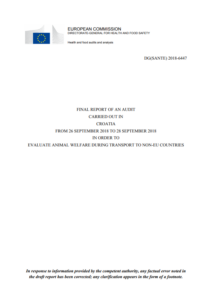After several complaints by NGOs and EU Parliament members, the European Commission conducted an audit during September 2018, regarding the live export industry in the Croatian port of Raša. The report indicates various animal welfare issues for European animals that are being exported to the Middle East and North Africa.
Raša is one of Europe’s major exit points for live animals. In 2017, there were 2,164 trucks of live animals, which were loaded onto 78 vessels, most of which sailing to Lebanon, Israel, Turkey and Iraq.
[smlsubform prepend=”GET THE SAFETY4SEA IN YOUR INBOX!” showname=false emailtxt=”” emailholder=”Enter your email address” showsubmit=true submittxt=”Submit” jsthanks=false thankyou=”Thank you for subscribing to our mailing list”]
The report shows that the Croatian system to approve livestock vessels for transport in the EU and for inspecting them before each loading does not minimise the risk of adverse welfare conditions for the animals during the journey. This is because the veterinary inspectors have neither sufficiently detailed instructions nor sufficient technical knowledge to assess properly the vessel’s facilities and they allocate a very short time to inspect vessels.
In addition, local authorities had not authorized a classification society to verify the strength calculations of pen rails and decks on livestock carriers.
The system in place is insufficient to minimise the risks that can negatively affect the welfare of the animals that arrive at the port and that are transported further by sea
the report states.
What is more, the audit revealed that today’s arrangements at the port do not ensure the welfare of the animals if there is a delay in loading a vessel, as there are no contingency plans from the transporter or from the authorities to deal with such a situation.
Furthermore, breaches of EU law regarding animal welfare were also presented. Specifically, for four days the uncoordinated arrival of 101 trucks was observed when daytime temperatures were more than 30°C, the legal limit for animal transports. The report highlights that with these conditions ‘the loading of vehicles at departure should not have been carried out.’
You can learn more in the following PDF































































